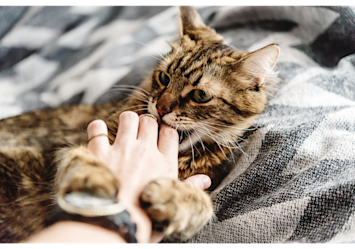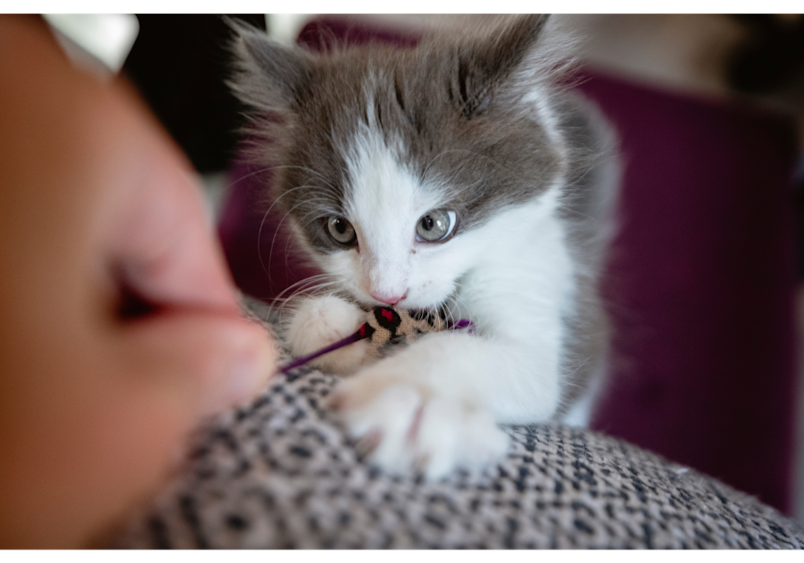
There are few situations in life more thrilling than adopting a cute kitten. With big round eyes and an exceptionally playful nature, a kitten is one of the least threatening animals imaginable—except when you reach down to pick up your seemingly innocent furry friend and they suddenly decide to sink their teeth into your finger!
If you’ve found yourself in this situation before, you’ve probably wondered, “Why does my kitten bite me and other objects out of the blue?” or “Why does my kitten bite my face, hands, and feet?” Could it be possible that you’ve accidentally adopted a ferocious baby tiger or panther by mistake? Fortunately, the answer is no, not likely! In fact, your kitten is probably just showing off their feline instincts.
But just exactly why do kittens bite so much? What is it that makes them want to nibble on seemingly everyone and everything?
Why Does My Kitten Bite Me?
There isn’t just one explanation for why a kitten won’t stop biting. In fact, there are several reasons for this behavior. Young felines have a lot to learn. In the wild, adult felines rely on their instincts to hunt for food, find shelter, and protect themselves from threats. Their teeth are essential tools that they depend on for survival.
Kittens Bite to Explore
The next time you’re wondering, “Why is my kitten biting me?”, keep this in mind: Your kitten is in training to become a full-fledged adult cat! Biting is a way for them to explore the world around them. When they nibble on something, they learn more about that object. They can discover its texture, taste, and smell, and what happens when they bite it (i.e., does it bite back?).

Kittens Bite to Play
Which leads to a second reason your kitten bites. A young cat often gently bites other felines when they’re playing. This is because cats, like other creatures, use play as a way of learning how to navigate social interactions in the animal kingdom. It gives them the opportunity to learn what interactions are safe (chasing each other) and which will cause conflict (actual bites). This type of play also helps them refine their hunting skills.
Sometimes, even when playing, kittens can even simply get overwhelmed with excitement and bite because they don’t know how to contain their happiness!
Kittens Bite When They’re Teething
You’re probably familiar with the fact that human babies nibble on things when their first teeth come in. Kittens are no different! They get their first set of teeth around three weeks old. At around four months old, these teeth fall out and they begin to get their adult teeth. When their teeth are beginning to erupt, kittens typically begin trying to chew on everything as a way to ease the pain and help their teeth come through. In this case, the kitten biting phase only lasts up to nine months at the latest.
Why Do Kittens Bite? Other Reasons to Consider
“My kitten keeps biting me, even though they aren’t teething or playing,” you might be thinking. Unfortunately, sometimes biting is caused by other factors. One of them is stress. If your cat is feeling overwhelmed by the presence of a new pet or infant, or your family has switched homes, they may not be acclimating well. Signs of a stressed cat include excessive grooming, urinating in places outside the litterbox, and meowing constantly. These signs can clue you in that you need to intervene with your cat’s behavior.
Kittens may also bite as a form of aggression if they’re feeling territorial. For example, your kitten may try to bite the family’s dog when they walk over to the cat’s favorite human. This can be their way of saying, “That’s my resource.” Additionally, a kitten might bite another cat in the neighborhood if that feline wanders into your yard. Of course, these aggressive bites are much more severe than playful ones.
Interestingly, some cats also sometimes gently bite as a way to express affection!
How do you know if a bite is a cause for concern?
First and foremost, playful or affectionate bites don’t break the skin or leave a mark. Problematic bites can cause a deep wound and cause your skin to become infected. If your cat bites you hard enough to leave a mark, it’s always a good idea to go to the doctor to get it checked out. Additionally, it’s worth noting that if you or a family member are ever bitten by a stray cat, you should seek medical attention right away to be treated for a possible rabies or other infections.
How to Stop Your Kitten from Biting
At this point, you’re likely wondering, how do I stop my kitten from biting and attacking me, then? The strategy for nipping this behavior in the bud depends on the reasons behind it. If you notice that your cat tends to bite when they’re playing, you can encourage gentle play. Model the type of play you want your kitten to engage in. That means no roughhousing and more mental activities (such as showing them how to play with puzzle toys).
You can also learn how to read your cat and begin to understand their emotions. This can alert you to potential triggers for biting. For instance, if you notice their pupils are dilated or their ears are lower, they’re probably feeling anxious or stressed. On the other hand, a kitten that kneads you or stretches out with their tail extended is showing signs that they’re feeling content and at ease.
If your cat is getting overstimulated during playtime, finding ways to get your cat active throughout the day can help get their energy out so they don’t resort to biting. Additionally, make sure you devote time to bonding with your kitten so they don’t bite to get your attention.

What to Do When Your Kitten Bites
When your kitten bites you during play, gently redirect them. If you suspect your furry friend is trying to get your attention with their bites, don’t react. This way, they’ll be less likely to associate biting with tricking you into interacting with them.
It’s never a bad idea to enlist the help of an experienced cat trainer, cat behaviorist, or veterinarian. They can help identify triggers for your cat’s behavior and find ways to modify your home to put your cat at ease. For instance, a cat behaviorist could point out that your home doesn’t currently offer a cat-friendly “escape route” when they’re feeling threatened. The behaviorist might suggest putting up a cat tree or shelving specifically designed for felines. This way your cat has a place where they feel safe.
A cat trainer can work with your kitten to teach them to respond to commands. These can come in handy when your cat starts to bite, so you can simply tell them what to do. On the other hand, sometimes a visit to the vet can make a big difference in your pet’s behavior. A thorough medical exam may discover your kitten has a dental issue, infection, or other ailment. A vet can also make sure you’re well-versed in how to take care of a new kitten to ensure all their needs are being met, including their emotional needs. This outside perspective can be instrumental in identifying triggers.
The Role of Pet Insurance in Kitten Care
While biting is often a normal cat behavior that’s no cause for alarm, you want to be prepared in case your kitten’s biting is more problematic. In this case, biting could prompt a visit to the vet. If you’re worried about the cost of such a visit, you’re not alone. Many pet owners find themselves struggling to afford the cost of veterinarian care, especially concerning those unexpected visits.
This is where kitten insurance can really help! A robust policy and an optional, non-insurance wellness plan can help make the financial side of pet ownership as simple as possible. With the right insurance policy in place, you can worry less about paying for necessary medical care and focus on your kitten’s health.
Kitten Bites Aren’t All Equal
When your friends ask you whether your kitten is aggressive, you can reassure them by telling them, “My kitten keeps biting me because they’re teething or just playing.” You can also let people know that playful biting is a very common cat behavior that’s different from aggressive biting. If your cat does seem to be biting because they feel threatened or predatory, then steps must be taken to stop them from harming others.
In short, is it normal for kittens to bite? Yes. Whether it’s a problem depends on how strong the bite is and the reasons behind the behavior. In most cases, you can relax and know that it’s typically a problem that cats outgrow.
With a bit of problem-solving, you and your kitten will work through their biting phase in just a short amount of time!